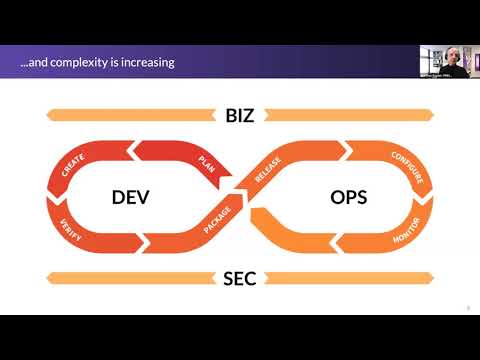DevOps Tools Explained
DevOps teams rely on tools and platforms that foster collaboration and communication, reduce security risk, and automate time-consuming manual tasks.
DevOps aims to bridge the gap between application development and IT operations to allow organizations to create better software faster than ever before. DevOps tools and platforms provide a framework to empower teams to plan, build, deploy, monitor, and keep track of operations and feedback. Without these tools and platforms, organizations would have an increasingly difficult task managing software development lifecycles as the complexity and scale of the systems they're developing increase.
DevOps tools are applications that help to streamline the process of developing software. Most DevOps tools focus on one or more of the following areas:
- Communication and collaboration
- CI/deployment automation
- Test automation
- Version control
- Container management
- Monitoring
- Configuration management
- Artifact management
As organizations turn ideas into software to fuel their businesses, they are increasingly relying on DevOps tools to make that happen. DevOps tools empower companies to more quickly, efficiently, and securely develop and deploy software products that engage with customers, promote the brand, and increase revenue.
Here are just a few of the ways DevOps tools can help teams drive real business benefits:
- Save time and resources by automating repetitive tasks
- Minimize risks by integrating security and compliance into your software development lifecycle
- Improve customer satisfaction by delivering safer, higher-quality software, faster
Because DevOps ties all parts of the software development lifecycle together, it may be tempting to cobble together various tools to speed up software delivery. But going this route comes at a price:- the time spent integrating and maintaining the toolchain instead of coding and delivering software. That's the DevOps toolchain tax.
Executing development and production processes across multiple tools will ultimately slow down the delivery of products, impact communication, and reduce overall code quality. Setting up numerous integrations can be daunting and, more importantly, many of these are not just a one-time setup, as new projects require new component connections. The solution to this problem is a single end-to-end DevOps platform.
GitLab's One DevOps Platform gives IT teams a single application that covers the entire software lifecycle, giving everyone an overview of projects as they progress from planning to deployment, monitoring, and documentation. GitLab simplifies the entire toolchain, allowing your teams to work together as a unified, collaborative system while maintaining a high level of security.
Plan
Identifying the work to be done is the first step in the DevOps toolchain. This allows tasks to be prioritized and tracked.
Build
Enabling developers to easily create feature branches, review code, merge branches, and fix bugs allows for a smooth development cycle.
Continuous integration and deployment
Running automated tests each time code is checked in or merged ensures that bugs are detected early and fixed before they get to production.
Monitor
Monitoring your application and production server performance, as well as managing incidents, is critical to the smooth operation of your software.
Operate
Ensuring the released system can scale automatically as needed is one of the ways to guarantee smooth system operations.
Continuous feedback
Distilling and sharing information empowers organizations to develop accurate insights into how well the software is received and used.
Implementing DevOps tools significantly enhances the collaboration between development and operations teams, optimizing the software development process. These tools streamline the entire lifecycle, from initial planning to final deployment, while improving software quality through continuous testing and deployment. With real-time visibility and robust feedback loops, along with thorough code reviews, teams can achieve swift deployment and uphold stringent software project standards.
GitLab's One DevOps Platform is a prime example, offering an integrated suite of tools that consolidates code repositories, application deployment, and monitoring into a seamless, effective workflow. As DevOps processes evolve, utilizing such platforms ensures organizations can meet the rapid demands of software development, maintaining an edge with efficient operations and superior team collaboration.
Take a deep dive into GitLab's DevOps platform
Frequently Asked Questions
Frequently Asked Questions
DevOps tools are applications that streamline the software development process by bridging the gap between application development and IT operations. Most DevOps tools focus on communication and collaboration, CI/deployment automation, test automation, version control, container management, monitoring, configuration management, and artifact management to help organizations create better software faster.
The DevOps toolchain tax is the time spent integrating and maintaining multiple disconnected tools instead of coding and delivering software. Executing processes across multiple tools ultimately slows down product delivery, impacts communication, and reduces overall code quality. Setting up numerous integrations is daunting and requires ongoing maintenance as new projects need new component connections.
DevOps tools save time and resources by automating repetitive tasks, minimize risks by integrating security and compliance into the software development lifecycle, and improve customer satisfaction by delivering safer, higher-quality software faster. These tools empower companies to more quickly, efficiently, and securely develop and deploy products.
An end-to-end DevOps platform provides a single application covering the entire software lifecycle from planning to deployment, monitoring, and documentation. This eliminates the toolchain tax of maintaining multiple integrations, enables teams to work as a unified collaborative system, and provides everyone with project overview while maintaining high security levels.
The six stages are plan for identifying and prioritizing work, build for creating feature branches and reviewing code, continuous integration and deployment for running automated tests, monitor for tracking application and server performance, operate for ensuring systems scale automatically, and continuous feedback for distilling information to develop insights.
Learn more about continuous integration tools
Start building faster today
See what your team can do with the intelligent orchestration platform for DevSecOps.






